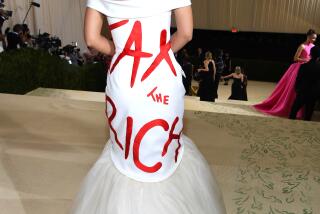Readers React: Will a wealth tax work in America?
Thomas Piketty’s proposal to tax Americans’ assets over $1.5 million is totally illogical economically. (“Why the rich are rattled,” Opinion, April 29)
We already have an asset tax on real property, which, like Piketty’s proposal, makes no distinction between gross and net assets (so that properties underwater due to debt get fully taxed on their gross value, hastening foreclosures).
We also already have heavy taxes on business revenue and profits. If we were to add the asset taxes Piketty recommends, small businesses would be forced either to cut their growth and jobs or (if they are not highly profitable) to go out of business, requiring even more taxes to pay for the additional unemployed.
Finally, if you limit this asset tax to passive investors, you will be stealing from pension plan investments needed for retirement. A 4% return on $1.5 million is just $60,000.
If your investment assets are just going to be taxed away, why save at all?
Peter Rich
Los Angeles
Piketty’s empirical study of the distribution of wealth makes it clear that hard work is neither necessary nor sufficient for becoming rich. The exceptions have been thanks to unusual times or extreme luck.
Overwhelmingly, the wealthy have inherited their money, not earned it. Inherited wealth is not affected by market fluctuations but builds slowly.
But the poor, being dependent on income, cannot save, and so remain poor.
Piketty’s solution is an annual tax on capital. A more drastic solution would be restructuring businesses so that workers share in their firm’s profits. This would lead to greater financial equality, which would allow greater participation in government and greater democracy. It would prevent the buildup of inherited wealth.
Such a proposal violates the current business ethos, but given the suffering and injustice of the present system, maybe a drastic solution is needed.
Charles Crittenden
Lake View Terrace
It’s too bad that columnist Doyle McManus did not include the title of Piketty’s book, “Capital in the 21st Century.”
Not only does the omission leave the reader with an incomplete reference to the book, but the title itself is also an homage to the three-volume work by Karl Marx, “Capital: Critique of Political Economy.”
Marx’s “Capital” never doubted the productive power and innovation of capital, but it discovered long ago what Piketty and hundreds of other economists are increasingly finding to be empirically true today: that capitalism is an eroding social system.
Capitalism promotes the creation of enormous productivity and wealth, but the rise in wealth, which must come if the system is to be successful, is only sustained by the creation of a rising social inequality.
Like the classical authors before him, Piketty offers very real economic explanations for serious erosions in our democracy today.
Phillip Gray
Long Beach
More to Read
A cure for the common opinion
Get thought-provoking perspectives with our weekly newsletter.
You may occasionally receive promotional content from the Los Angeles Times.










